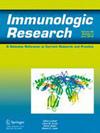Staphylococcus aureus α-hemolysin induces DNA methylation changes in human Th1 cells.
IF 3.1
4区 医学
Q3 IMMUNOLOGY
引用次数: 0
Abstract
α-Hemolysin is one of the most dangerous virulence factors produced by Staphylococcus aureus. Among the immune cells that respond to this pathogenic bacterium, Th1 lymphocytes play a critical role. In our study, we investigated the impact of α-hemolysin on the methylation of the Th1 cell genome. Our findings revealed that α-hemolysin upregulates HELLS and DNMT3A expression while downregulating DNMT3L expression at the protein level. Whole-genome bisulfite sequencing analysis revealed significant alterations in DNA methylation, particularly in regions outside CpG sequences. These results suggest that bacterial proteins can act as potent epigenetic modulators in human cells, influencing their activity, plasticity, and phenotype.
金黄色葡萄球菌α-溶血素诱导人Th1细胞DNA甲基化变化。
α-溶血素是金黄色葡萄球菌产生的最危险的毒力因子之一。在对这种致病菌有反应的免疫细胞中,Th1淋巴细胞起着关键作用。在我们的研究中,我们研究了α-溶血素对Th1细胞基因组甲基化的影响。结果表明,α-溶血素在蛋白水平上调HELLS和DNMT3A的表达,下调DNMT3L的表达。全基因组亚硫酸氢盐测序分析显示DNA甲基化显著改变,特别是在CpG序列外的区域。这些结果表明,细菌蛋白可以在人类细胞中作为有效的表观遗传调节剂,影响其活性、可塑性和表型。
本文章由计算机程序翻译,如有差异,请以英文原文为准。
求助全文
约1分钟内获得全文
求助全文
来源期刊

Immunologic Research
医学-免疫学
CiteScore
6.90
自引率
0.00%
发文量
83
审稿时长
6-12 weeks
期刊介绍:
IMMUNOLOGIC RESEARCH represents a unique medium for the presentation, interpretation, and clarification of complex scientific data. Information is presented in the form of interpretive synthesis reviews, original research articles, symposia, editorials, and theoretical essays. The scope of coverage extends to cellular immunology, immunogenetics, molecular and structural immunology, immunoregulation and autoimmunity, immunopathology, tumor immunology, host defense and microbial immunity, including viral immunology, immunohematology, mucosal immunity, complement, transplantation immunology, clinical immunology, neuroimmunology, immunoendocrinology, immunotoxicology, translational immunology, and history of immunology.
 求助内容:
求助内容: 应助结果提醒方式:
应助结果提醒方式:


